“Some people say they’ve never had vegan food – yes they have! They just didn’t know it”: Zineb Hattab on plant-based cooking at KLE and DAR
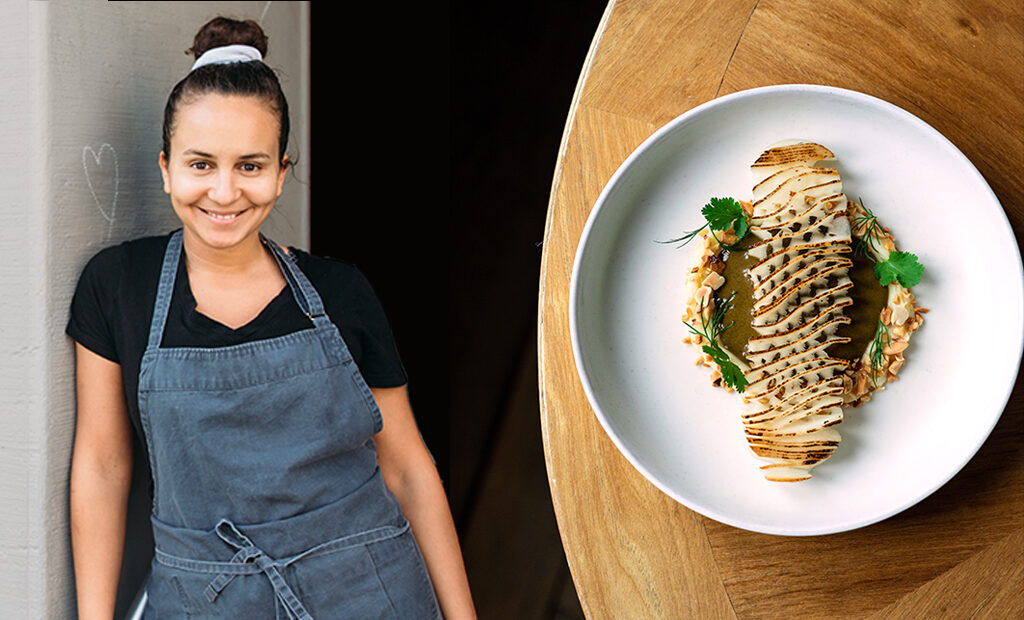
Zineb “Zizi” Hattab is a progressive chef of Spanish and Moroccan heritage, who advocates for changes in the restaurant industry, from better working conditions to promoting diversity, one plant-based dish at a time. After beginning a career as a software engineer, Hattab cut her teeth in the kitchens of top restaurants the world over, from Nerua to El Celler de Can Roca and Osteria Francescana. One day, she decided to write a letter to Andreas Caminada expressing her wish to work at Schloss Schauenstein: it was the start of her adventure in Switzerland. After a stint as executive chef at Cosme in New York, Hattab returned to the Helvetic nation to open her first restaurant, KLE (plant, in German), in Zurich, at the beginning of the pandemic, and kept leaping over hurdles, launching a more casual sister project, DAR, a year later. A recipient of a Michelin star in the 2023 Swiss guide and a 50 Next Class of 2022 fellow, the chef is making waves across Europe.
The day our paths crossed in Bilbao I’d just had lunch at Nerua, which is where your career started. Do you have good memories of working with Josean?
Yes! Though I also struggled because I was not ready for what I was getting into, but I learned a lot.
What made you abandon your original career as a software engineer?
It was the hunger that cooking gave me – and the passion. I remember when I was an engineer and I would have meetings, I would always be thinking of what I was going to cook, the people I was going to invite, the menu and testing new things, so it was always at the back of my mind. It grew and grew and, at some point, it didn’t make any sense to stay in my job because I wouldn’t get enough of it. So I just decided to go for it, but there was not a specific moment; it was like a growing thing.
Was working with Andreas Caminada part of the reason you decided to open in Zurich?
After Andreas, I left for New York, which is a huge city. It’s the best and the worst of everything; there’s a lot of art and music and a lot of inspiration, but it’s also very competitive, seven days a week. There’s a lot of crime and you finish work at two or three in the morning. Going in the subway, I could see situations that I didn’t want to find myself in, long-term. Zurich was kind of in between that and a small city. Of course, it has nothing to do with New York but it’s not the middle of nowhere, like where Andreas is, which is the charm of the Schloss, but I like the diversity here and to also be aware and be able to escape when I need to. Most of my family is still in Morocco and Spain, and my brother is actually in England, so Zurich is in between everything, and I like the country because the nature is amazing. And, yes, Andreas helped me love it because he has such a passion for Switzerland. He knows the products very well and introduced me to some I was not aware of.
When you planned the opening of KLE, did you already have going fully plant-based in mind?
Actually, it was not in the plan. Everywhere I worked it was very much animal protein-based. It was only a month before – I already had the menu and I had already visited all the cheese producers and I knew, from whom I wanted to buy the meat – but as it was starting to become real, I figured that I needed to make a difference and that I needed a bigger reason than myself or my Moroccan background to open a restaurant. I thought that having a positive impact on the planet and reducing our footprint was something that would keep me motivated. We cook and consume a lot of food every week and, after checking the numbers, it just came quite clear to me that the best choice would be for me to go plant-based. At first, I had to try it myself, so I started eating plant-based and I saw how difficult it was, actually, to eat out in Zurich. I just wanted to have a place where it’s just normal: you don’t need to choose two dishes from a whole menu, “plant-based” isn’t written anywhere. I just wanted to offer a normal dining experience without labels that also happens to be plant-based. This is what we do at KLA: you don’t see quotes or pictures of animals or anything like that, it’s just a cosy restaurant with nice service and delicious food, and that’s what people take with them.
As you might know [chuckles], there is a famous Swiss chef who works in New York who turned his business plant-based – was that an inspiration for you?
Daniel has the position and exposure to have a lot of impact, and I think in the end we look up to those people who have reached a status like actors in Hollywood – in this case, celebrity chefs – and he really has the power to change a lot of minds, and has a platform. I think it’s great that he did that. I haven’t been since the shift but I’m sure he has an amazing team behind him and the resources to do great things. I look forward to trying it.
Was there a dish of your own that made you realise you could go in that direction full-on?
We had many dishes that were already vegan, like this gnocchi sardi with a dry tomato and almond pesto. It was very simple, but everything was homemade and people couldn’t get enough of it. It was just to show that traditional food actually has a lot of plant-based elements.
Being Italian, we have so many plant-based dishes that don’t have that label as such, they’re just part of our culture. Spaghetti al pomodoro is the most obvious example. No one questions the validity of those dishes, people just go for them.
I think the label is the problem or the handicap because I have a gazpacho, nice lentils too, a nice couscous from my mother, which is with seven kinds of vegetables – this is already all vegan but we never connected the dots. It’s like the people who say “I’ve never had vegan” – yes you have! You just didn’t know it. I’m sure you’ve had some spaghetti with tomatoes.
Tell me about some of your most talked-about dishes. I’ve heard about the Eggless Egg, the Beet Tartare and of course the Kentucky Fried Mushroom.
These dishes came after the beginning. First, we started doing things we knew how to do because none of us actually came from a vegan background or a plant-based background. Then we started experimenting, and a dish I’m very proud of, for example, as you say, is the KFM. When you taste it, it’s even better than having chicken, and then we have the Barbecue Mushroom Sandwich, which is mushrooms treated like meat on a barbecue, and it has a ranch sauce. These two are influenced by my time in the US. Then we have a carrot dish, where the carrot is brined and smoked for three days, and it has also pickles, onion and chive. When you pickle it for three days, it develops this bite. It’s more meaty but it doesn’t have any meat substitutes, it’s just a vegetable that is treated with different techniques. Thanks to all the places I’ve been, I have all this know-how that I can put into vegetables. When I was in Thailand, for example, I loved papaya salads, but they usually had fish sauce and we don’t have papayas in Switzerland, so I did a version with apples and wild peanuts from a fair producer, and this is also one of the favourite dishes. Now we have Tortellini alla Panna, and everybody wants more of this one; it’s inspired by my time in Modena. So we bring a taste of the mortadella inside, with pistachios and olives. Many of the aromas of meats can be matched. It’s like a good chorizo… a nice mortadella will taste of pistachio, thyme and olives, so if you combine them in a very good pasta it will convince people. We try to trigger the memory, we know how the palate works and we work with this – and if it’s good for you, then it’s even better.
When you said chorizo I thought about Diego Guerrero’s “surprise” vegan one, which you taste and then find out it’s plant-based. It was super good.
Yes, but unfortunately there are a lot of bad products on the market that don’t put plant-based in a good position, from pork substitutes to cheeses. They are not helping the movement.
The other day I went to a Rolling Stones concert and there was a stand selling chicken burgers. I had one and it was obviously plant-based, but it wasn’t mentioned clearly, there was just a tiny note at the bottom of the sign. If you write “chicken” it should be chicken, not a substitute.
I agree. For example, we don’t say anywhere what we do is vegan but you’re never going to read chicken on our menu. Take the Kentucky Fried Mushroom: we say mushroom, not chicken. I think transparency is important – you don’t want to make the customers feel like are being made a fool of. If you’re doing plant-based chicken then you have to write “plant-based chicken” exactly.
I understand your mission isn’t only to cook good food, it’s also putting together a healthy environment for the staff and giving more opportunities to women. How did you envision your workplace in terms of equality and diversity?
I already come from a male-dominated industry – software engineering – so I’m used to it. You need to feel represented, so we have a 50/50 team. If a place is all-male, a lot of women will not apply because it doesn’t look attractive. As the owner and chef of the restaurant, I do attract a lot of women but it’s the whole team that represents ethnicity and sexuality. It’s a process: on day one we weren’t as diverse as we are today. It has been always a priority that whoever joins us will be able to feel comfortable with themselves. We are very much open about mental health too, so we support whoever needs time off. Otherwise, people are only able to work 60% or 80% if they never get time for themselves. Some have families and, in many places, it’s a problem, especially for women, but we just adapt ourselves to it. We have to create the possibility for them to do their job. KLE and DAR aren’t places where you work from this time to this time, where you come, you produce and you leave. We have tried to create morning shifts and positions that are two days a week. It’s a lot of work but it’s worth it because you get many different energies and many different personalities, which is also fun. You should come and see the team, they’re a bit crazy. At some point, Alessandro, my Italian head chef, told me he couldn’t deal with it because one day someone is high and someone else is low. But, at the end of the day, it’s very nice that you can just be yourself and if you have a bad day you just come in and say, “Hey, this happened” or “I need my space”. We are a safe space to be, also because many people are migrants, like me, who have a partner or even no one.
Could you talk me through the guest experience at KLE?
KLE is where I am at the moment; it’s a very old-school building, 200 years old. It’s a little home in the corner and I wanted this because I’m the opposite. I’m not Swiss and I’m all over the place, so I wanted to have a kind of balance. It’s a small dining room, actually, and we have a front-of-house team between three and four, it’s a horizontal organisation and they swap roles. If you have been here they will know because they are very good with faces. If not, they will introduce you to what we do, and we do quite simple food but it’s all with local produce, especially seasonal produce. So we introduce our guests to what is growing here because if you go to the supermarket you can find strawberries all year round but that’s not in season in Switzerland. We start always with our pillow bread, which is kind of a signature thing because I’m Moroccan and you always start with bread on the table. It’s the only component that is meant to be shared – all the other dishes are individual portions. Then we walk you through the ingredients of that season. We started with home cooking and it has evolved into a much more creative and innovative concept because people wanted that, because they haven’t experienced plant-based in that direction. So we started with a la carte and a tasting menu, but we saw that everyone wanted the tasting menu, so we took away the a la carte and now we just work with between eight and ten dishes. It’s usually things that you cannot have in other places. It’s not a vegan schnitzel, it’s dishes that we create with our experience of where we have been. Alessandro has a lot of influence as well on the menu, but sometimes I come back from a trip and I want to change everything. We want to deliver a combination of flavours that people haven’t had before – it’s very personal. I think it’s important for people also to connect with personal experiences. For example, we usually have a tostada to start and if you have been to Mexico you probably have had a tostada, and if you haven’t, we use such a quality of corn and ingredients that it will take you there. This was thanks to my two years and a half with Enrique Olvera. In some cases, it’s just whatever comes into my head. Sometimes we do something, we test it and we like it and people say they never had these flavours in their lives; the important thing is that they like it [laughs]. We aren’t an experimental place where it’s more about an abstract idea and it’s ok if you don’t like it – no, taste for us is number one. I like to see people enjoy what they eat and to trigger their minds, hoping they get out saying, “Oh, maybe we could eat like this every day”. Even if they went plant-based a couple of days a week, every small change makes a difference.
What about dessert? That’s trickier without having access to dairy products or eggs.
I would say it’s the cherry on the cake and we work a lot on the desserts because of all the bad experiences I had with vegan desserts. They are usually too heavy and at the end of the meal you don’t want to have something like that. At the moment, we have the Lemon Pie: it’s very acidic, with lemongrass, verbena custard and a meringue, which is burnt and it tastes just like an egg-white meringue. Then we have the Raspberry Vinegar Cake with raspberries and a strawberry cream, which is based on Petite Swiss, a tiny strawberry yoghurt that was very popular in the 90s. We also have a mint ice cream with chocolate, so everything is quite fresh, and it’s designed just to finish up. I think desserts are one of the favourite things at KLE. It is hard to do this without dairy, eggs – you just need to work on it and not settle for something less than the non-vegan. If I make a meringue, I want it to be better than an egg meringue, and until then I will not put it on the menu.
What’s your opinion about lab-grown meat?
I think those kinds of products are for meat eaters. All products that look like meat are for people who eat meat and they just want to reduce the impact of their consumption. I think vegetarian and vegan people are not so much into those alternatives. I also think it’s a generational thing: I don’t think the generation that are now four or five years old will need food to look like meat because they will be more used to not eating it as much as we did. I grew up eating burgers, chicken nuggets and steak, so it has to look like what I grew up eating. It’s changing a lot – even the people who are now ten years old will have another understanding of how food looks. Take milk: a lot of children are already drinking oat milk or rice milk, and I never had that. I had horchata, because I’m Spanish, but I never thought “Oh it’s vegan” – it was just a drink.
It could end the suffering of billions of animals.
As an engineer, I worked in slaughterhouses because of one of our biggest clients. They slaughtered chickens and turkeys and back then I was quite immune to it. I saw how it works and I think anything is better than it. The level of industrialisation we have come to is quite crazy but it’s quite in the dark, so if you are not working in the industry you don’t realise it.
I don’t buy any meat from the supermarket because anything mass-produced cannot be good.
Yes, there’s just too much demand. The cows that are here in Zurich walking around are not the ones that are involved in the supermarket.
Tell me about the experience at DAR.
DAR is much louder, it’s much more colourful. It’s more about the people at the table. It’s a sharing concept and, in Morocco, you all eat from the middle of the table. It also has a lot of Spanish influences because those two countries are very much my identity, with Moroccan parents and a Spanish education. It’s much bigger portions but we don’t sacrifice the flavour – and it happens to be vegan as well. It shares the same values as KLE – seasonal, regional and plant-based – but the experience is completely different. KLE is small and cute and very intimate, and the service is all on you and makes you feel very welcome. At DAR, it’s much more about having fun, having a nice night out – or a brunch.
You were part of the Class of 2022 at 50 Next. What do you think of that project and the event?
It was interesting to meet a lot of people from other branches of the industry, not only the chefs. I have been already in other 50 Best galas because of the people I worked with, Andreas and Enrique. There, it’s only chefs and it’s very much focused on the persona and the restaurant, and in this case it was interesting to learn about those that are in technology, those, for example, who gather garbage from the sea or – in my case – the ones that are working on plant-based alternatives. The food industry is much bigger than the restaurants; people are buying in the supermarket on a daily basis and those are the products that can make a big difference, the ones that are available every day in large amounts. It was great the fact it was much smaller than the classic 50 Best events and yet it was very interesting. I don’t know how it is going to impact what we do with the restaurants but maybe we can inspire some people to do more plant-based food.
For us, it’s more about seeing how we are creating these conversations with our guests. Many people arrive in a negative position such as, “I came here because my son wanted to try it but I will go after here to eat a steak”, but then, at the end of the evening, you see how their opinion has changed: some want to come back to bring their teams from work. This actually happens on a daily basis. About 50 Next, it’s cool they did this and took away the spotlight from the restaurants and the celebrities, and turned it onto the whole food industry.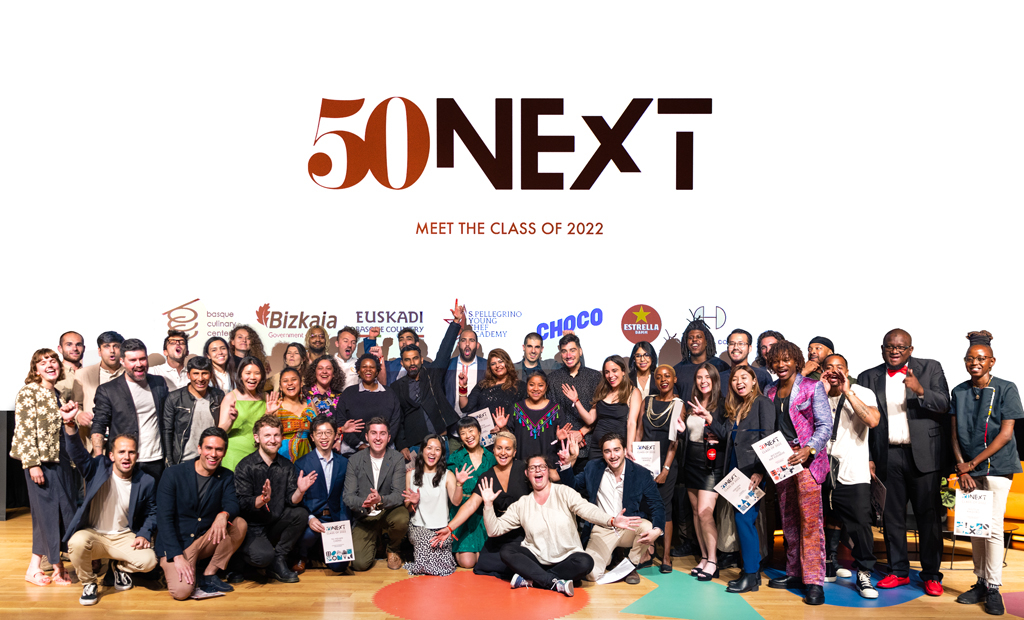
Did you manage to connect with other people who had a similar way of thinking?
Yes, I did manage to connect and have conversations. There were the guys from Ghetto Gastro from New York – they’re doing nice projects in the Bronx and I feel very much connected to New York and also chefs that I would like to invite to cook in Zurich who are also cooking plant-based. There are always these four-hand collaborations but, for us, they have to be plant-based, we cannot bring into our restaurants someone who’s going to make sushi, so it was nice to connect with these people from other places in the world working with the same goal of normalising eating plant-based a little bit. There was this Greek guy, Lefteris Arapakis, who works in 40 ports gathering garbage from the ocean with fishermen. Coming from a country like Morocco where the fishing industry is in crisis, if I can connect with someone from my country and also help, I’m always open to. It’s not all about cooking, I like to do many other things too.
Finally tell me about Zurich, who else is going in a plant-based direction? Do you have a community of like-minded chefs?
There are not many, unfortunately, but it’s growing. There is a restaurant called Barranco: they are not vegan but they do a lot of plant-based. It’s a Peruvian restaurant and it’s delicious. They do a great job. There’s Anoah: the chef is a very young chef, he’s doing all plant-based. Recently, we were in the National Museum doing a month’s pop-up with six other stands. They wanted it to be fully vegan. Then there’s White Rabbit Bakery by Bianca Legorreta; she’s from Denmark and she does only vegan pastries – it’s going quite well. There are other chefs who are also orienting more into vegetables, but they still haven’t jumped all the way. Outside Zurich, Andreas [Caminada] has opened Oz, which is vegetarian, next to the schloss. It’s a ten-seater chef’s table, fully vegetarian, with products from the garden. Marco Campanella, from Ascona, is doing a lot of vegan. Then there is Dominik Hartmann. He’s doing vegetarian and he has two stars. We all worked together at the schloss at some point. There are some but there could be more.
Thank you Zineb, it was a pleasure to talk with you today. I hope I’ll be in Zurich soon so I can try your food – both KLE and DAR sound very interesting.
Of course! Thank you Filippo and all the best.
Filippo L’Astorina, the Editor
Photos: Erna Drion
For further information about KLE, DAR and Zineb Hattab visit the restaurant’s website here.

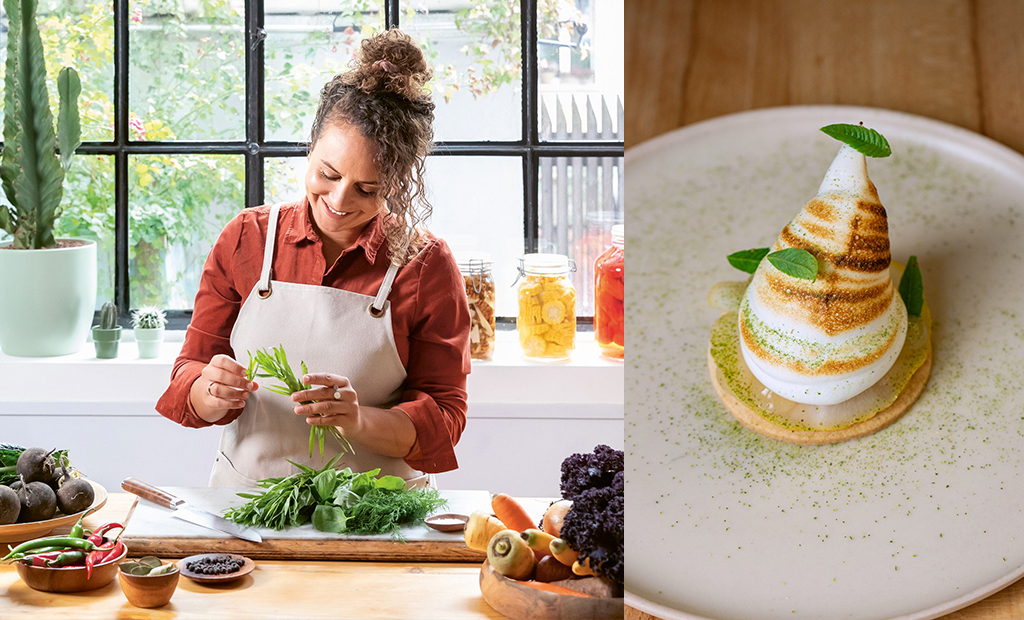
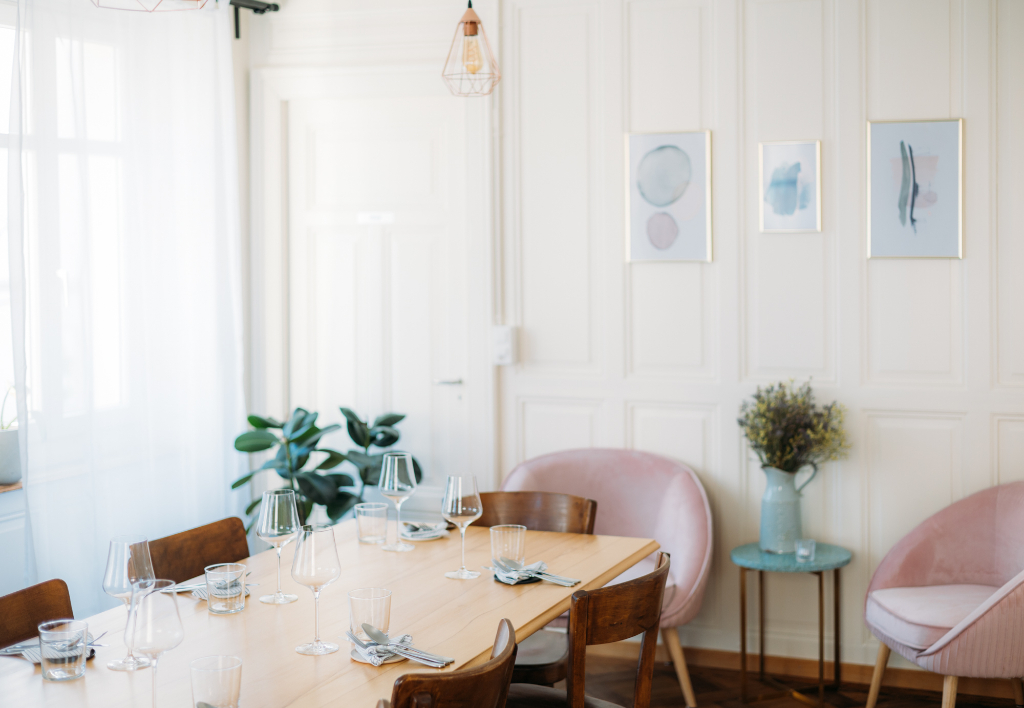
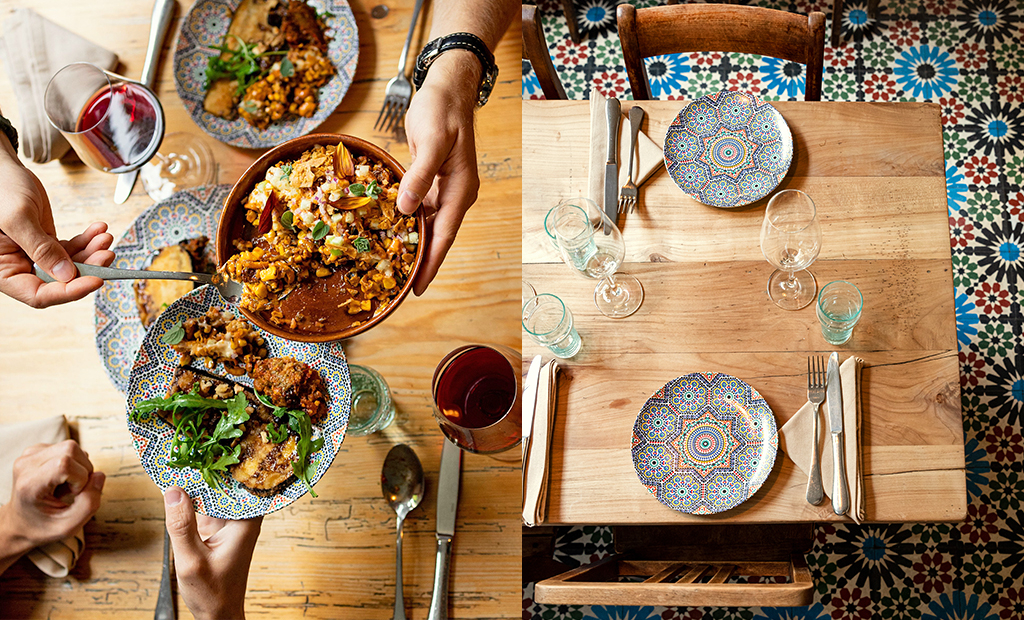
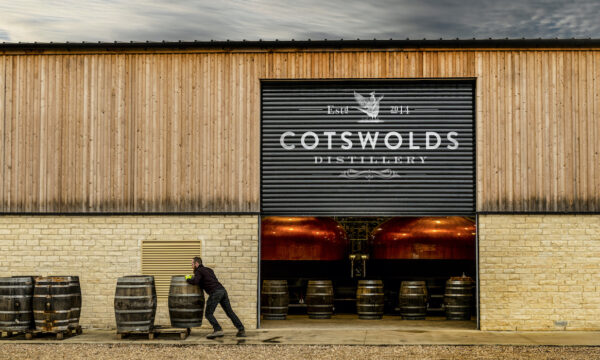
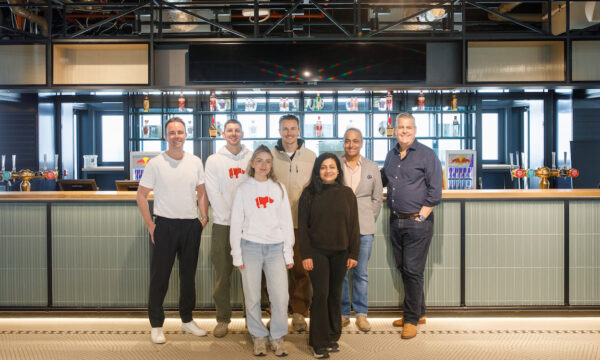
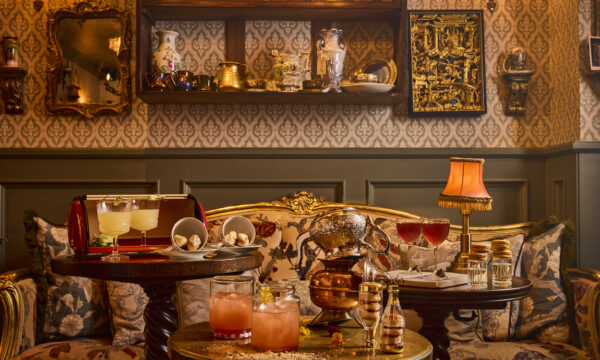
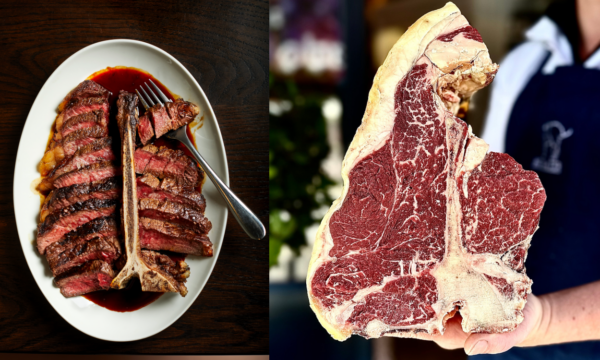
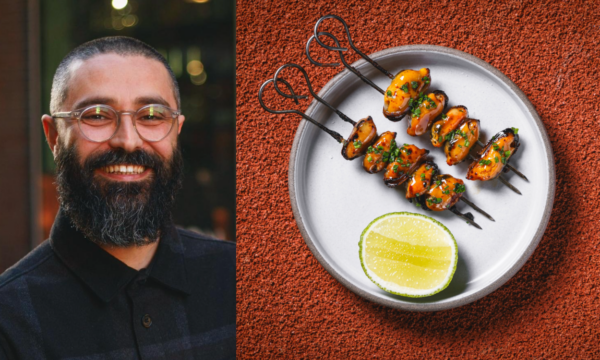
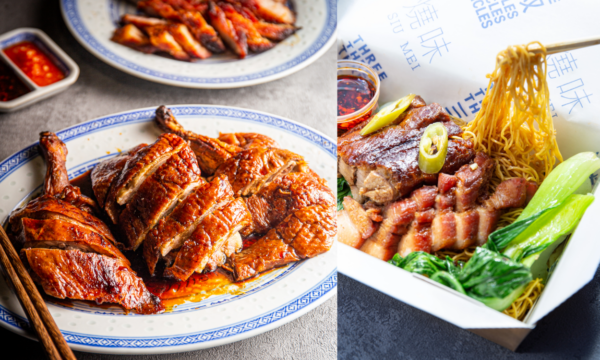
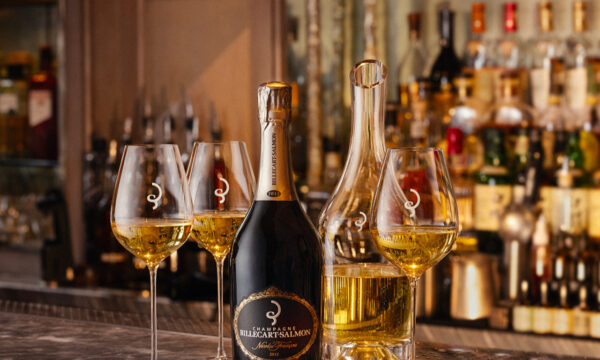
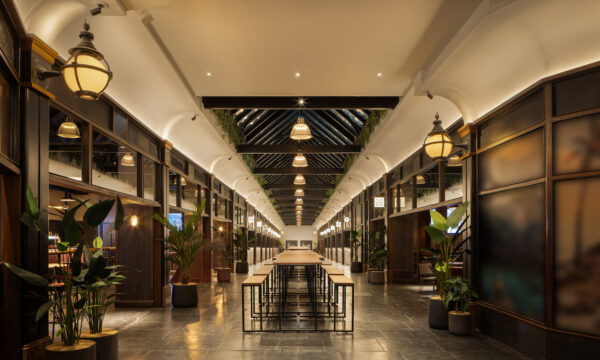
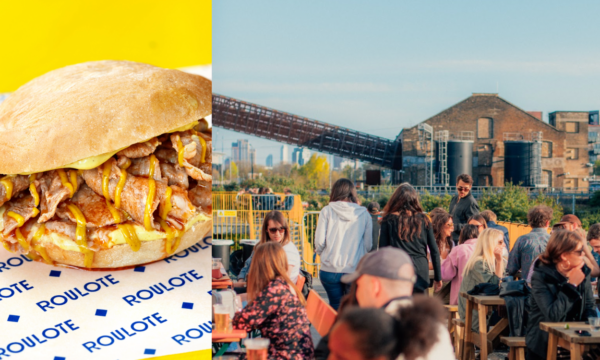














Facebook
Twitter
Instagram
YouTube
RSS